New odysseys! Nine under-the-radar Greek islands
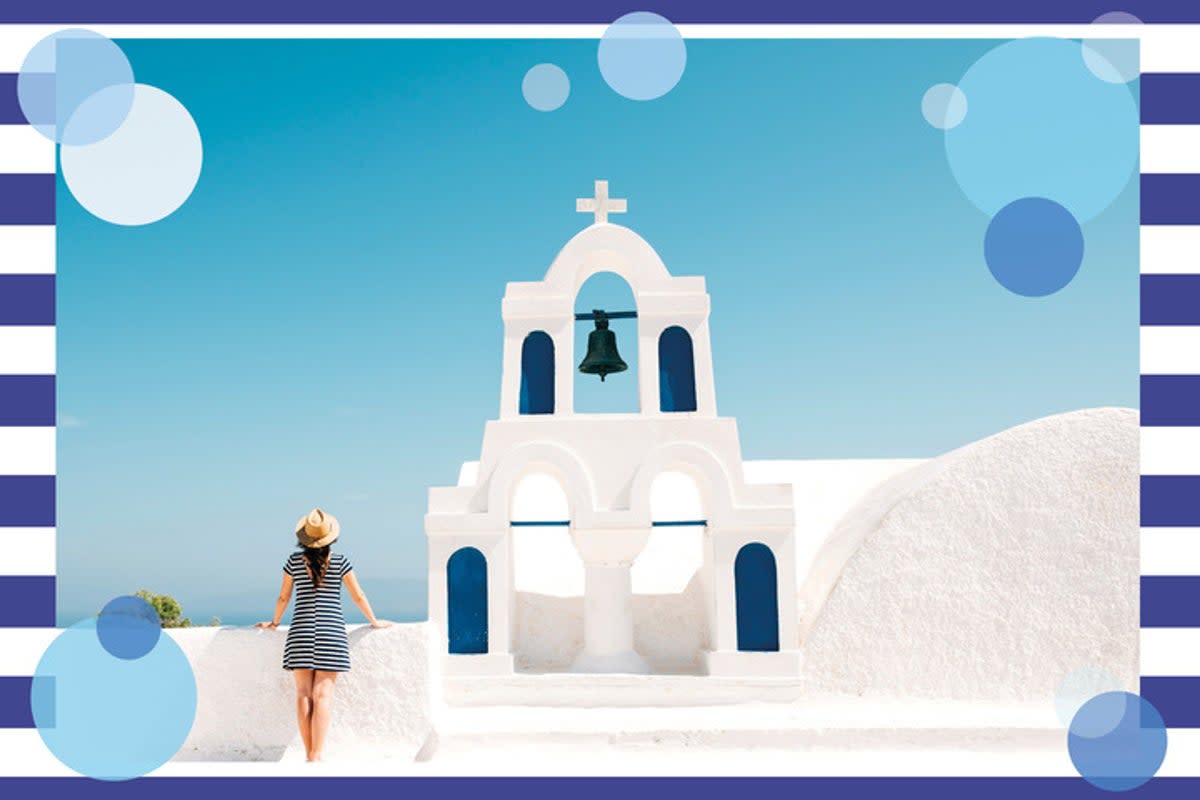
The most ravishing and surreal of the Greek islands tend to be the farthest-flung, and like anything worthwhile require the most effort. Even one ferry ride from the islands with airports tends to sieve out the hen parties, influencer-swarmed beaches and tourists spilling out of cruise ships. The extra leg (or two) will lead to drowsy sugar-cube villages, cliff-clinging monasteries and coves whose soft, sandy underbellies are exposed by the gin-clear water and that sharp Grecian sunlight. These are the under-the-radar Greek islands to visit this summer (before the crowds discover them).
Folegandros
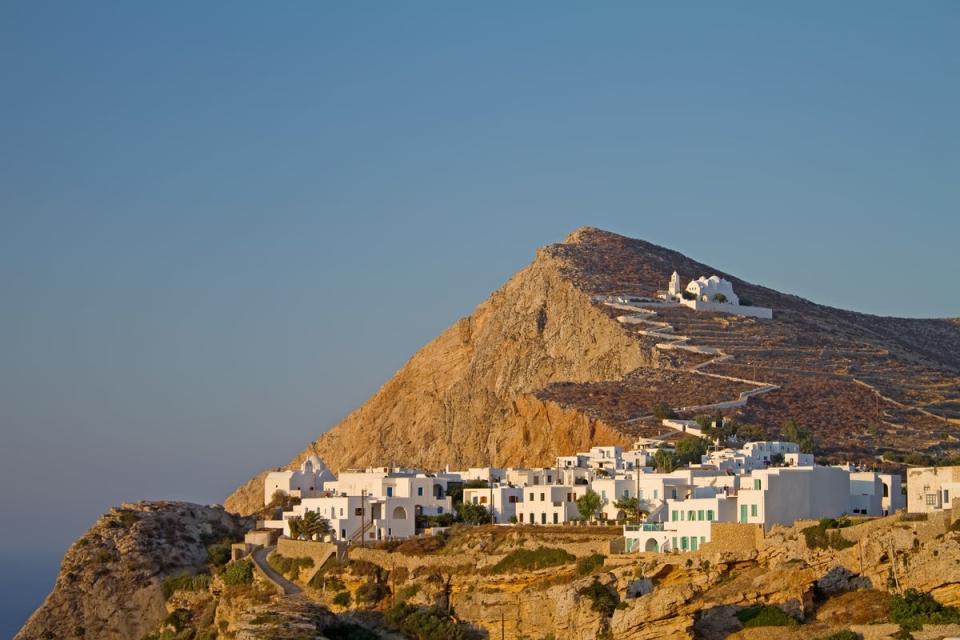
This 12-mile Cycladic slice of loveliness is tricky to reach, with ferries from Santorini proving frustratingly elusive. But once there, and fully ensconced in Folegandros’s pure flickering light and silencing beauty, it’s all about the beaches (Fira, Agios Georgios, Kartego), tavernas that grill whatever the boat’s just brought in and floating through its Cycladic-style towns and villages (Chora, Kastro, Ano Meria).
Stay: Anemi (anemihotel.gr) is a white-washed boutique hideaway with lemon yellow accents, mere moments from the sea and with a pretty pool overlooking the Aegean Sea.
Naxos

The ultimate island-hopping base, Naxos is the largest of the Cyclades and is relatively unscathed by tourism, despite its knockout beaches, time-capsule mountain villages and proximity to the party island of Mykonos. Of all its beaches, Agios Prokopios is considered by most good judges to be the prettiest, Grotta beach is where snorkellers head to explore the underwater ruins of an ancient city, and Pyrgaki is a wild, parasol-and-beach-bar-free stretch of sand. The mix of Venetian and Cycladic architecture also gives Naxos an edge over the surrounding islands — days can be spent exploring the capital’s Venetian mansions, 13th-century hilltop forts and one of the oldest temples in Greece. The island doesn’t rely as heavily on tourism as others, meaning there’s no mass off-season exodus, which makes it charming to visit all year round.
Stay: Boho-beautiful and adult-only Naxian on the Beach (naxianonthebeach.com) makes the most of the island’s powder-soft stretches of sand. It’s all driftwood and wicker, modish spins on Greek classics and earthy linens that mirror the sun-baked long grasses flanking Plaka Beach.
Syros
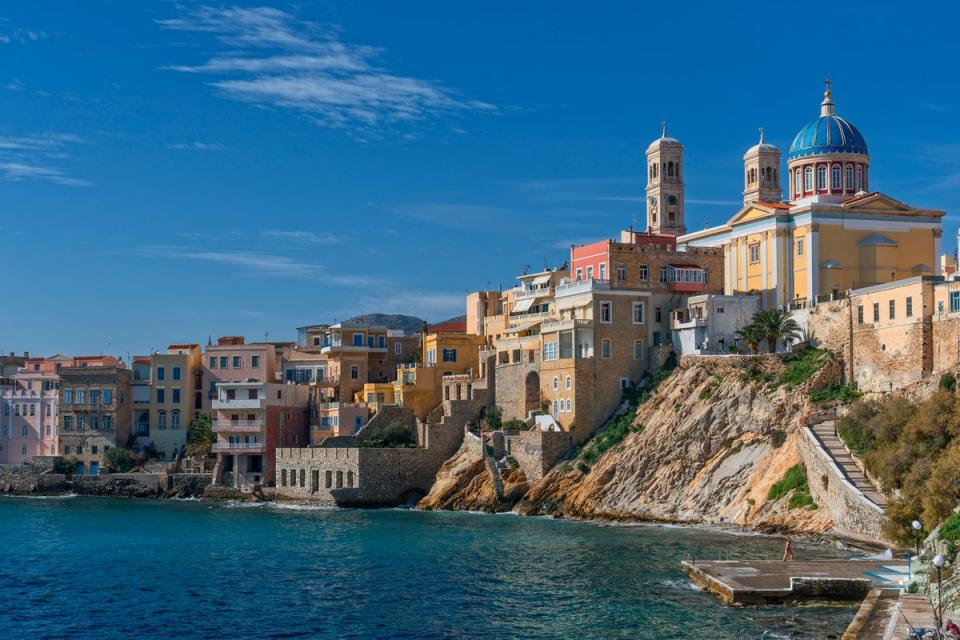
Small and sleepy Syros is the commercial and political capital of the Cyclades, where pocket-sized sandy beaches and an easy-going attitude pair with its main town’s neoclassical piles and rich trading heritage. In summer, wild fennel and sage cling to the hot air and Athenians wash down fresh fish and chicken souvlaki with tsipouro in go-slow tavernas tipping over the beach (visit Ambela Tavern at Megas Gialos). Days are spent wallowing in Galissas beach’s glassy waters or reading a book to the background clang of goatbells, before flinging on the linen for a soirée at Ermoupoli’s impressive Apollo Theatre, or taking a deep dive into Syros’s haute foodie scene (Mazi and Allou Giallou).
Stay: Contemporary slices of marble Grecian busts and palm leaves decorate vast, uncluttered spaces at Aristide Hotel (hotelaristide.com). Sun-trap courtyards with perfect little pools soothe any reluctance to book a town-based hotel, as does its proximity to the beach.
Amorgos
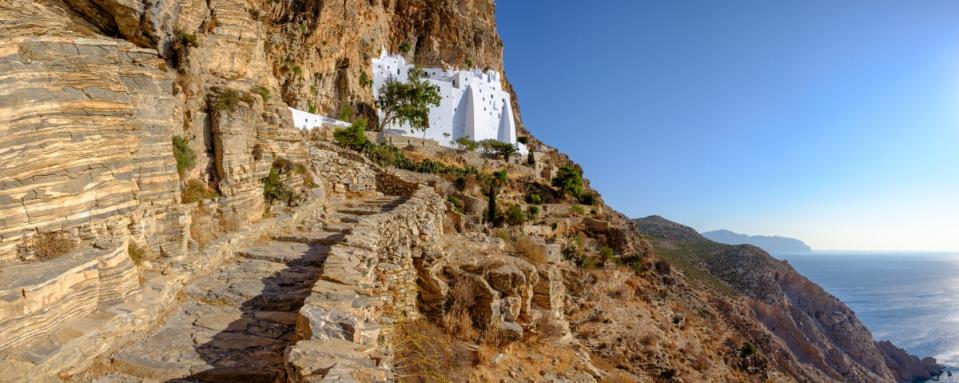
Divers are in heaven on Amorgos, with its underwater caves ablaze with marine life, and shipwrecks, such as the cargo vessel Marina 3 just off nearby Skinopi. On land, explore the windmill-dotted Chora’s streets via the Fotodotis walking path or scale a winding path and 300 steps to the monastery of Hozoviotissa dating back to 1017 and carved into a steep cliff overlooking the sea. For that whitewashed backdrop of Clycadic reverie with locals sipping strong Greek coffee in clouds of smoke, head to Tholaria, and pull up a blue chair at family-run Santouraki for home-cooked classics and their own Greek cheeses.
Stay: Vorina Ktismata (vorinaktismata.com) is one of those Greek boutique hotels any off-grid traveller would hope for. Its stylishly pared-down interiors and painted shutters blink out over a bewildering haze of mountains, sea and valleys. Breakfast is a feast of traditional cheese pies and local yoghurt and honey.
Milos
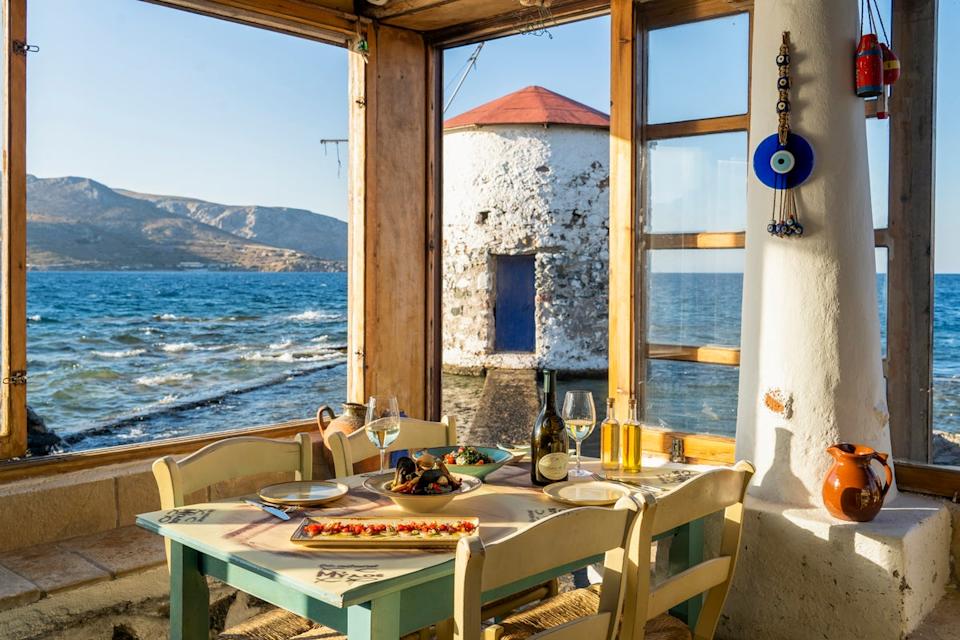
Although it’s crept onto a number of Instagram homepages and many a Greek island travel blog, Milos still retains an air of moonlike mystery, with its luminous milky chunks of rock that dip into azure waters and its abundance of little churches. Visitors can take their pick from about 70 ethereal beaches (head to Sarakiniko and Kleftiko). Those drawn to the lunar-like isle will find a fresh scene emerging, one that is deeply reverential to Milos’ landscape and traditions, with boho-chic, earthy hotels, restaurants placing creative spins on traditional Greek fare and the coastal plunder, and bars that capture the quiet charm of this beguiling isle. The ferry from Athens takes under five hours and the island pairs beautifully with Folegandros, Sifnos or Kimolos.
Stay: Check into Skinopi Lodge (skinopi.com) for its photo-ready pools, lovely lo-fi interiors and Dalmatian coast views.
Kimolos
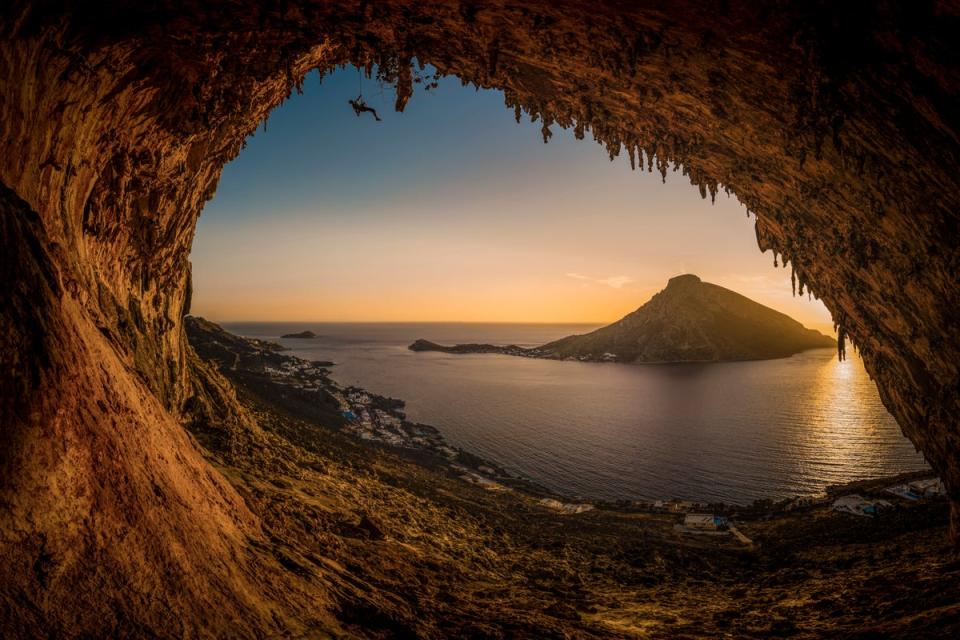
Just next to moonscape Milos, Kimolos is a small fleck of Cycladic paradise popular with the yachting crowds and those after an off-beat island summer. Having docked at Poliegos, the yachties tend to chug in for taverna fare and that warm Greek hospitality — expect a seafood feast rounded off with strong coffee and chocolate pie at make-shift Postali just next to the port. Kimolos is all about its beaches — Aliki, Kalamitsi and Bonatsa are among some of the most beautiful, with white sands that slope into glassy, turquoise waters and are typically backed by rustic tavernas. Pull up a sky-blue chair at nearby Palaia Agora Grill for some of the Cyclades’ best souvlaki.
Stay: Windmill Kimolos boutique hotel (windmillkimolos.reserve-online.net) with its pretty, white-washed turret and olive-shaded windows peering over a bright-blue Aegean. Its location, between the port of Kimolos and Chorio (the island’s only village), makes it an ideal perch for exploring both the beaches and cultural spots.
Leros
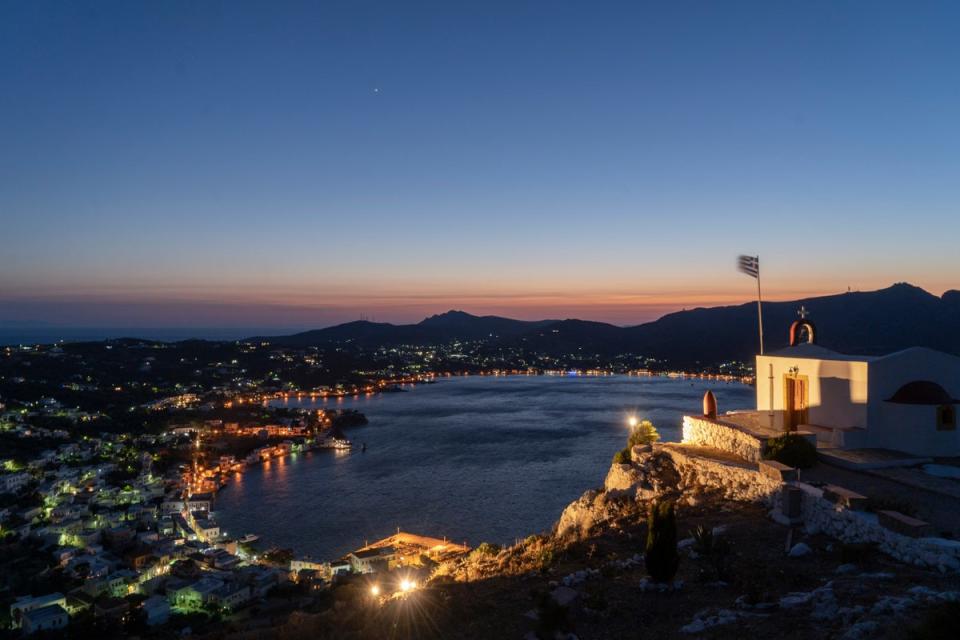
One of the lesser-known of the Dodecanese, Leros is lush and hilly while its mosaic of architecture, food and culture is particularly intriguing to visitors. The island is teeming with churches, some chiselled into the cliff edges, others on their own little islets, and all cultural spots can be easily paired with a trip to a nearby beach, such as Dioliskaria beach (remote and reached along a long path), Violiskaria beach is backed by a number of tavernas grilling the fisherman’s catch, while Alinda’s northern end at the cove of Dio Liskaria is less crowded and other-wordly to swim in.
Stay: Not far from Alinda beach lies 19th-century Venetian villa Archontiko Angelou (hotel-angelou-leros.com), lost in acres of vineyards and rolling hills carpeted with wildflowers.
Aegina
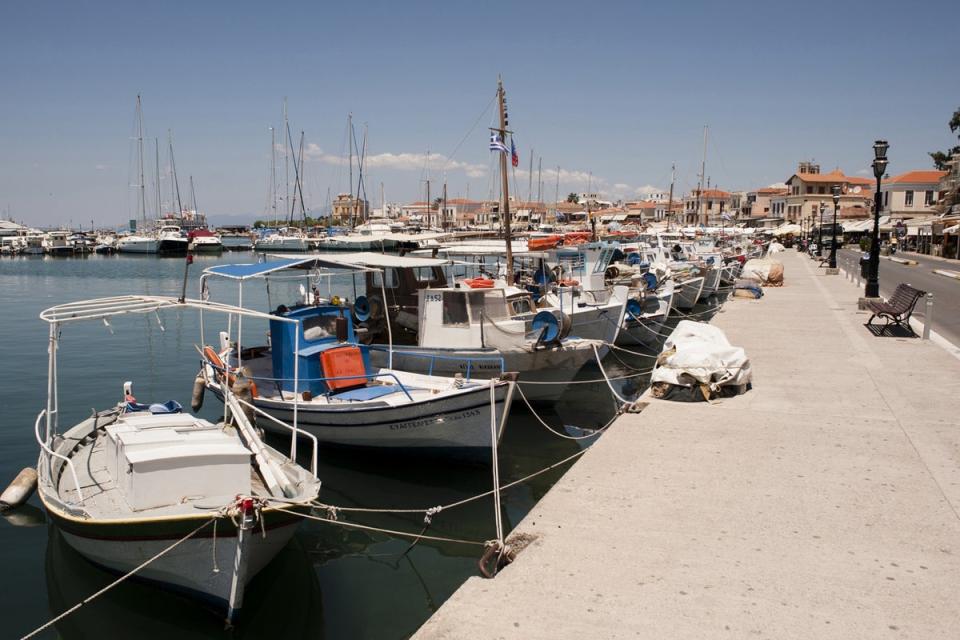
It may be close to Athens but Aegina runs on island time and to the rhythm of weathered fishing boats drifting with the current in the port. The island’s main town was once the capital of Greece, and relics of this grandiose era are fascinating to observe, along with the ancient Temple of Aphaia (take in the views from its hilltop perch). A trip to Aegina wouldn’t be complete without a wander through the abandoned village of Paleachora, or a trip to Perdika village for its seafood joints tipping over the water and its sandy coves.
Stay: For a mix of beach, shops, restaurants and cultural jaunts, Alefi Place on Airbnb (airbnb.co.uk), in downtown Aegina, lies 30 metres from the beach and is an easy scoot from the port.
Alonnisos
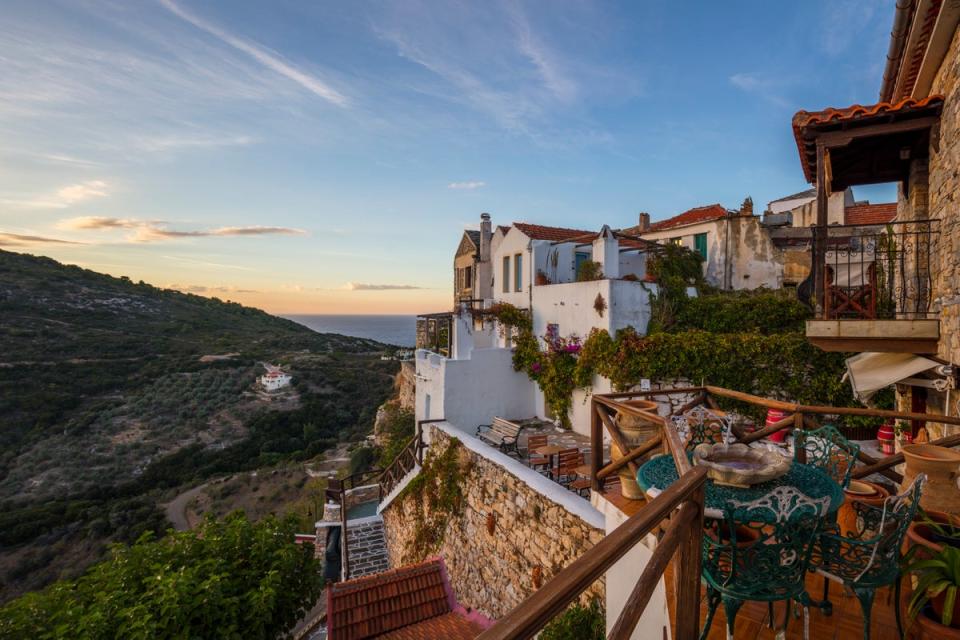
Proper Mamma Mia territory, Alonnisos is one of those Greek isles whispered around knowing groups, speaking the same language of morning rises to the distant clang of bells, docile afternoons along empty east coast beaches, and taverna nights that demand little more than a linen shirt and good conversation. The beaches here are ravishing. Agios Dimitros spans both sides of a pointed headland with a lush green interior and smooth white pebbles that dip into the sea. Glifa is known for its blue waters, while Kokkinokastro takes its name from the red-hued cliffs that slice the beach in two and is also a stellar spot for snorkelling. Alonnisos is surrounded by a vast national marine park, with rare sea birds, marine life and mammals such as Mediterranean monk seals.
Stay: There’s an unwritten rule in Alonnisos that you never share your location. Locals and a few in-the-know loyalists keep this Caribbean-of-Europe to themselves. The Thinking Traveller’s Hibiscus villa (thethinkingtraveller.com), woven into the pine-carpeted slopes overlooking a calm sea, with a path leading to its own empty beach, perfectly embodies this spirit of quiet (and rather smug) discovery.


